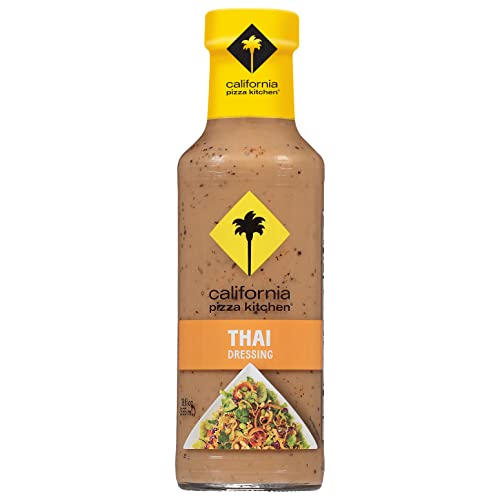Is California Pizza Kitchen Thai Dressing Vegetarian?

Description
Bright, sweet-savory flavor with balanced tang and mild heat; smooth, creamy texture that coats greens evenly. Commonly used as a salad dressing, dipping sauce for appetizers, or marinade for proteins. Reviewers cite consistent taste, convenient bottle format, and versatility, noting it adds bold flavor without overpowering other components across meals.

Description
Bright, sweet-savory flavor with balanced tang and mild heat; smooth, creamy texture that coats greens evenly. Commonly used as a salad dressing, dipping sauce for appetizers, or marinade for proteins. Reviewers cite consistent taste, convenient bottle format, and versatility, noting it adds bold flavor without overpowering other components across meals.
Ingredients
Water, sugar, sunflower seed butter (sunflower seeds, sugar, mono- and diglycerides, salt), rice vinegar, soy sauce (water, wheat, soybeans, salt, alcohol, lactic acid), brown sugar, sesame oil, distilled vinegar, less than 2% of dried ginger, salt, vegetable oil (canola and/or soybean oil), modified corn starch, spices, natural flavor, xanthan gum, potassium sorbate, sodium benzoate, and calcium disodium EDTA (to protect quality). Contains 5% or less of sesame seeds, soy, and wheat.
What is a Vegetarian diet?
A vegetarian diet eliminates meat, poultry, and fish but typically includes dairy, eggs, and plant-based foods. People adopt it for ethical, environmental, or health reasons. This diet emphasizes fruits, vegetables, legumes, grains, nuts, and seeds as key nutrient sources. Vegetarians often get protein from eggs, tofu, beans, and lentils. It can offer health benefits such as reduced risk of heart disease and improved weight management, though attention should be given to nutrients like iron, zinc, and vitamin B12. With proper planning, a vegetarian diet can be both nutritionally complete and sustainable.
Similar Products
Schar Gluten Free Pizza Crusts
CHEEZE LOVER'S WITH MOZZARELLA & CHEDDAR STYLE SHREDS THIN CRUST GLUTEN-FREE PIZZA, CHEEZE LOVER'S
Primal Kitchen Mayo with Avocado Oil Paleo Original -- 12 fl oz
Daiya Dairy-free Homestyle Ranch Dressing
Hidden Valley Original Ranch Salad Dressing & Topping, Gluten Free - 16 Ounce Bottle


